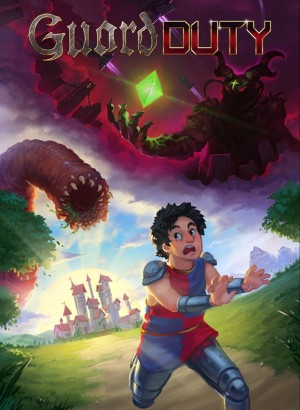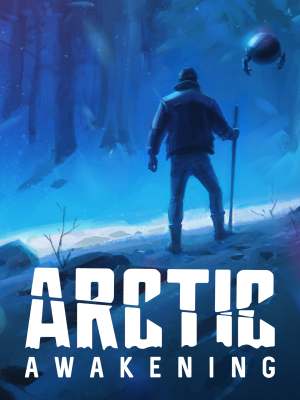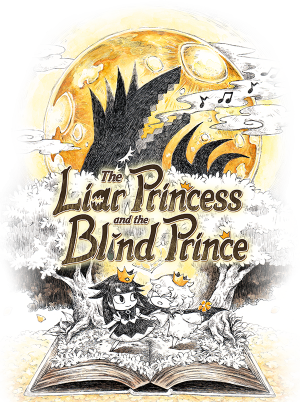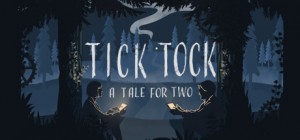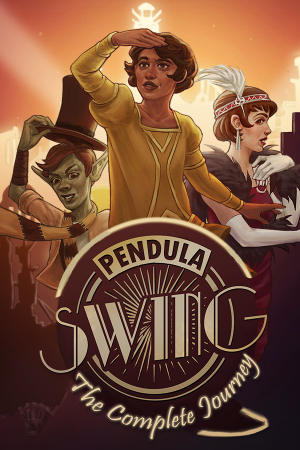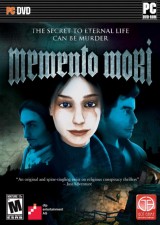Review for Guard Duty
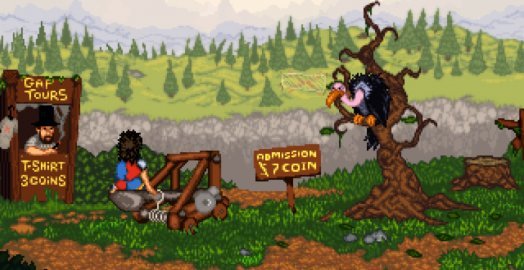
Point-and-click adventures don’t come much more traditional than Guard Duty. At a glance, one might be fooled into thinking it’s a long-lost title from LucasArts’ run of ‘90s classics, and certainly Sick Chicken Studios replicates that style and formula to painstaking degrees. While emulation can be the driving force for a game such as this, however, it also makes it more difficult for the product to stand on its own without the heavy pull of nostalgia. And indeed, this game struggles somewhat in establishing its own identity beyond familiar character archetypes and story tropes. Fortunately there is still a delightfully enthusiastic dual-timeline adventure to enjoy here, with a good helping of self-awareness and engaging positivity along the way.
The tale sets off from the medieval castle town of Wrinklewood before moving on to more fantastical territory and… sci-fi? I’ll get to that. Anyway, on a dreary night, a shadowy figure creeps into town and abducts Princess Theremin in order to execute his dark bid for ultimate power. Enter Tondbert Ruffskin, a guardsman charged with minding the town gates who was too drunk to notice the suspicious nature of the villainous man he let enter. Essentially a Guybrush Threepwood stand-in, Tondbert is an unlikely hero – or at least a bit dimwitted. But his heart is in the right place, and as soon as he sobers up and catches wind of ill happenings, he sets out on a quest to rescue the princess. While running into various snags in the road, of course.
Much of the humor comes at the expense of Tondbert, who doesn’t garner much respect from the other guards and is, at best, irrelevant in the eyes of the townsfolk. He is a prototypical underdog, taking on an impossible errand with just enough endearing optimism to see it through, despite all his fumbling. Your first task with him is to find a remedy to heal unfortunate bee stings that have swollen his face and left him with unintelligible speech (accompanied by helpful subtitles). If you choose to wander the few available sections of town and chat up the locals with Tondbert’s muffled gibberish, you will find exclusive dialogue on each occasion. For instance, when frustratedly trying to convey who he is, a couple characters mistakenly interpret his name as “Pond Dirt” and, ahem, “Dong Squirt.” This may be the only crass joke in the game, as Guard Duty is a rather lighthearted romp – until the third act rolls around and things get serious. All said, it only managed to squeeze a couple audible chuckles out of me, but I was grinning all through the journey due to the protagonist’s infectious charm.
The area where Guard Duty most departs from its bygone inspirations is in the simplicity of its puzzles. There are some moderately complex obstacles where you must rescue a knight from a giant spider by luring the eight-legged monstrosity through multiple screens, as well as a maze-like snowfield that necessitates the use of a compass. However, there are no convoluted combinations of items to fiddle with, and no befuddling inventory stuffers like a rubber chicken with a pulley in the middle. Puzzles follow straightforward logic with little fuss to accomplish objectives like finding a substitute to kiss a nasty crone who has promised an item you require, and jumping through hoops to attain your DLC (that’s “death liability contract”). Getting stuck at any point likely means you didn’t thoroughly scour the screen well enough with the cursor for things to interact with. This accessibility could either be a positive or negative depending on your fondness for the (arguably needless) ambiguity of old-school point-and-clicks. Or, you could land somewhere in the middle, like me, wanting to work your brain a little more but also glad you don’t end up trying every single object in your stock on every hotspot no matter how ridiculous the combination.
As hinted in the short-lived prologue, the story isn’t always a cheerful affair. Due to events in Tondbert’s time whose consequences come to a head in the distant future, about two-thirds of the way through you will be thrown nine hundred years forward into the boots of Starborn, an agent of a rebellion that is the last thing standing in the way of the evil Shoggoroth’s world-ruling corporation and the extinction of the human race. Starborn’s portion of the game invites a ton of comparison to the Metal Gear Solid franchise: espionage, radio conversations, technobabble, the obligatory “escape from prison” plot point, the Solid Snake-esque snarl of Starborn, and even some strikingly similar characterizations. The gameplay remains within the adventure realm, though – no skulking past guards or fiddling with crafty gadgets. About the closest thing to stealth you will encounter here is a sequence where you must figure out how to draw a security robot away from an elevator without revealing yourself. Even then, Starborn manually takes cover and if you mess up you can retry infinitely without reloading.
Starborn is a much more competent character than Tondbert, and with this narrative shift the game's inventory management becomes further streamlined. If experimentation was minimal before, it is now downright obsolete as items are contextual and used automatically when needed. The primary issue with this segment of the game is that a couple puzzles seem designed to prevent you from completing them through good old-fashioned problem solving. When tasked with escaping a jail cell, the solution is not even available without first calling one of Starborn’s contacts. Some puzzles are entirely stripped of their challenge, such as one involving mixing chemical compounds, where you are given remarkably clear instructions on how to successfully create what you need without any bumps in the process. Overall, Starborn’s story feels much more confined, with fewer screens to travel and further restrictions on player exploration. To be fair, this exemplifies the dystopian state of his timeline, but it certainly makes the end of the game feel somewhat underdeveloped.
With a few notable exceptions such as a kindly cave troll, a panicked man trapped in slowly melting ice, and Starborn’s technophile comrade Rugratt, the supporting characters are a touch unremarkable. Especially when compared to iconic franchises that are referenced throughout, such as Monkey Island. The sheer amount of dialogue and voice work is impressive, however, especially for an indie title. It does become noticeable that certain actors fill multiple roles, which makes some of the supporting cast seem to run together, and the dialogue fluctuates in volume at times as a side effect of separate recording sessions, yet it’s all delivered well and the actors clearly had fun in the process. I found myself right-clicking on every hotspot, which acts as the “examine” option, just to hear more amusing anecdotes from Tondbert or some of Starborn’s gruff candor.
As a faithful throwback, Guard Duty’s presentation is constructed entirely of hand-drawn pixel sprites and backgrounds, even going so far as assuming an outdated, non-widescreen resolution for that extra bit of authenticity. The character models are a little plain and generic looking, but I will not deny the craftsmanship put into each scene and the detailed animations that give life to it all. Wind tousles grass at a canyon’s edge, snow falls on approach of unwelcoming mountains, Tondbert takes a little hop over a crack in the ground, and Starborn engages in an improvised scuffle with a robot guard – all welcome details that add a worldliness to set pieces ranging from a feudal town square and curiosity shop to cold steel halls and even a space station. Layer on top of these a diverse score that incorporates synthesized medieval instrumentation and dark electronic vibrations, and the game represents a Frankenstein’s monster of disparate parts across the two timelines and narrative styles.
Guard Duty infuses this juxtaposition of spirited fantasy and grimly apocalyptic sci-fi with a common theme of positivity, that of protecting those you care about and never giving up in the face of seemingly insurmountable challenge. Clocking in at about five hours of play time, it is a fastidiously designed linear experience that flaunts its passion proudly. This is a lively adventure with simple puzzles that never strays from its goals, making some of its flaws seem negligible when taking a step back to see the whole picture. A kidnapped princess, power hungry villain, malevolent corporations and righteous rebellions, sealed evil and convenient magic artifacts with the power to eradicate it – these individual parts are surely derivative, and yet the amalgamation they form is compelling in its contrasts. It may not become a classic of the genre, but this is the type of game developed for a specific type of audience, those clamoring for a very traditional point-and-click adventure experience, and I am certain this particular group will look upon the outcome fondly.
Our Verdict:
Though it takes a while to find its own identity and the puzzles are all too simple, Guard Duty is a nostalgia-laden charmer that shows nothing but love and respect for the classic point-and-click titles it most resembles.


